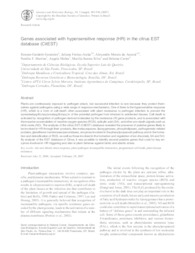Genes associated with hypersensitive response (HR) in the citrus EST database (CitEST).
Genes associated with hypersensitive response (HR) in the citrus EST database (CitEST).
Author(s): GUIDETTI-GONZALEZ, S.; FREITAS-ÁSTUA, J.; AMARAL, A. M. do; MARTINS, N. F.; MEHTA, A.; SILVA, M. S. S.; CARRER, H.
Summary: Plants are continuously exposed to pathogen attack, but successful infection is rare because they protect themselves against pathogens using a wide range of response mechanisms. One of them is the hypersensitive response (HR), which is a form of cell death often associated with plant resistance to pathogen infection to prevent the spreadsebpg@cnpq.br sebpg@cnpq.br of the potential pathogen from infected to uninfected tissues. Cell death is activated by recognition of pathogen-derived molecules by the resistance (R) gene products, and is associated with the massive accumulation of reactive oxygen species (ROS), salicylic acid (SA), and other pro-death signals such as nitric oxide (NO). The analysis of the citrus EST (CitEST) database revealed the presence of putative genes likely to be involved in HR through their products, like metacaspases, lipoxygenases, phospholipases, pathogenesis-related proteins, glutathione transferases/peroxidases, enzymes involved in the phenylpropanoid pathway and in the formation and detoxification of ROS, as well as those involved in the formation and regulation of ion channels, SA and NO. By analysis of the EST database of Citrus, it was possible to identify several putative genes that code for key enzymes involved in HR triggering and also in plant defense against biotic and abiotic stress.
Publication year: 2007
Types of publication: Journal article
Unit: Embrapa Cassava & Fruits
Observation
Some of Embrapa's publications are published as ePub files. To read them, use or download one of the following free software options to your computer or mobile device. Android: Google Play Books; IOS: iBooks; Windows and Linux: Calibre.
Access other publications
Access the Agricultural Research Database (BDPA) to consult Embrapa's full library collection and records.
Visit Embrapa Bookstore to purchase books and other publications sold by Embrapa.

